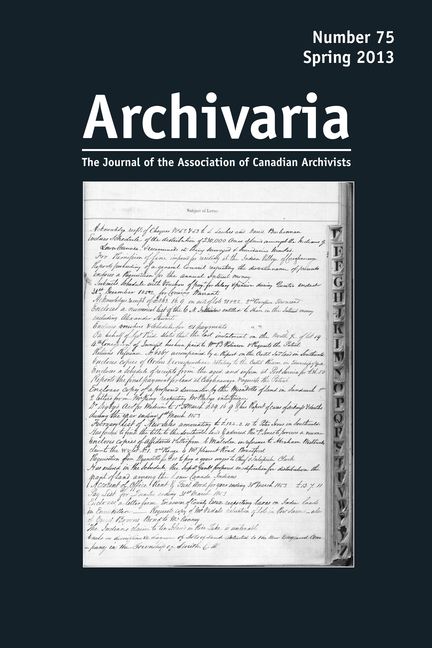Lester J. Cappon and the Creation of Records: The Diary and the Diarist
Résumé
This article is an exploration of Lester J. Cappon as an expert in historical evidence, documentary editing, and archival theory and practice, and of his own creation of archival sources and sense of leaving behind documentary traces for future researchers. It considers how Cappon used his diary as a memory device to document his life, career, and family, as well as a means to prod himself about his own scholarly projects (especially his concern about how to manage his time). It reviews the mechanics and physical characteristics of the diary. One would expect an individual with his interests and professional abilities to be more self-reflective about the diary process – and we are not disappointed. He wrote both to be read and remembered, including in his entries highly personal comments about himself and his career, as well as his family and colleagues. Cappon often used the diary as a means to reflect on his own career and its possibilities, especially as he reached his retirement years. It is also clear that he wrote the diary with a future audience in mind, many of the entries having a formality in expression and explanation.
RÉSUMÉ
Cet article est un examen de Lester J. Cappon comme expert en preuves historiques, en édition de documents et en théorie et pratique archivistiques, puis comme créateur de sources archivistiques, conscient de laisser des traces documentaires pour les chercheurs futurs. L’article se penche sur les façons dont Cappon s’est servi de son journal intime comme déclencheur de la mémoire dans le but de documenter sa vie, sa carrière et sa famille, puis comme moyen de se motiver à poursuivre ses propres projets de recherche (surtout les préoccupations avec la gestion de son temps). L’article expose les caractéristiques mécaniques et physiques du journal intime. On pourrait s’attendre à ce qu’une personne comme Cappon, avec ses intérêts et ses habiletés professionnelles soit plus porté à l’autoréflexion – et on n’est pas déçu. Cappon écrivait à la fois pour être lu et pour qu’on se rappelle de lui, choisissant d’inclure dans ses textes des commentaires très personnels à son égard et au sujet de sa carrière, ainsi qu’au sujet de sa famille et de ses collègues. Cappon se servait souvent de son journal intime comme moyen de réfléchir à sa propre carrière et aux possibilités quelle offrait, surtout quand il approchait de l’âge de la retraite. Il est clair aussi qu’il tenait son journal intime pour un lectorat futur, puisque plusieurs entrées sont très formelles, tant au niveau de l’expression que des explications.
Authors of manuscripts accepted for publication retain copyright in their work. They are required to sign the Agreement on Authors' Rights and Responsibilities that permits Archivaria to publish and disseminate the work in print and electronically. In the same agreement, authors are required to confirm that "the material submitted for publication in Archivaria, both in its paper and electronic versions, including reproductions of other works (e.g. photographs, maps, etc.) does not infringe upon any existing copyright." Authors of manuscripts accepted for publication retain copyright in their work and are able to publish their articles in institutional repositories or elsewhere as long as the piece is posted after its original appearance on archivaria.ca. Any reproduction within one year following the date of this agreement requires the permission of the General Editor.





